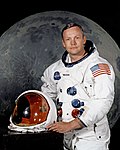Wikipedia:WikiProject Space 2019
| This page is currently inactive and is retained for historical reference. |
Welcome to the WikiProject Space 2019. This set of pages is used to coordinate efforts to mark the 50th anniversary of Apollo 11 mission. The goal of this project is to bring together the various projects handling curation of the Main Page in the hopes of running a themed takeover centered around Space Exploration.
This page is not for discussions. Please use the table below to find the most appropriate section to post in, or post in the miscellaneous section.
| WikiProject Space 2019 | ||||
|---|---|---|---|---|
|
|
|
|
|
|
|
| ||||
Sunday, July 21 (walk on the moon)
[edit]Today's featured article
Neil Armstrong (1930–2012) was an astronaut and aeronautical engineer who was the first person to walk on the Moon. He was a United States Naval Aviator who served in the Korean War and later worked as a test pilot. Armstrong joined the NASA Astronaut Corps in the second group, selected in 1962; he made his first spaceflight as command pilot of Gemini 8 in March 1966, becoming NASA's first civilian astronaut to fly in space. During this mission with pilot David Scott, he completed the first docking of two spacecraft. In July 1969, Armstrong and Apollo 11 lunar module pilot Buzz Aldrin performed the first crewed Moon landing, while Michael Collins remained in lunar orbit in the command module. Stepping onto the lunar surface, Armstrong said: "That's one small step for [a] man, one giant leap for mankind." He was later awarded the Presidential Medal of Freedom, the Congressional Space Medal of Honor and the Congressional Gold Medal. (Full article...)
DYK
[edit]- ... that Michael Collins (pictured) was the first person to perform two spacewalks?
- ... that the 1957 launch of Sputnik 1, the first artificial satellite, led to a period of public anxiety in United States and accelerated the Space Race?
- ... that Félicette, the first cat in space, had electrodes surgically implanted in her brain to assess her neurological activity?
- ... that Mae Jemison (pictured), the first black woman in space, worked at a Cambodian refugee camp in Thailand while in medical school and was a medical officer for the Peace Corps before becoming an astronaut?
- ... that ...
- ... that pilot-cosmonaut Yuri Gagarin, the first human in space and the first to orbit the Earth, ejected from his descending spacecraft at about 7,000 metres (23,000 ft)?
- ... that David Scott's performance under pressure during Gemini 8, the first mission to achieve a docking in space, led to his selection for the Apollo program?
- ... that two Russian tortoises
on Zond 5were among the first Earthlingsto flythat flew around the Moon and returned safely to Earth on Zond 5?
OTD
[edit]July 21: Belgian National Day (1831)
- 625 – Paulinus was consecrated as the first bishop of York by Justus, the archbishop of Canterbury.
- 1378 – Unrepresented labourers revolted and violently took over the government of the Republic of Florence (depicted), demanding that they be granted political office.
- 1946 – After weeks of unrest, rioters lynched Bolivian president Gualberto Villarroel, desecrating and hanging his corpse in the streets of La Paz.
- 1959 – The inaugural International Mathematical Olympiad, the leading mathematical competition for pre-university students, began in Romania.
- 1977 – Libyan forces carried out a raid at Sallum, sparking a four-day war with Egypt.
- John Atta Mills (b. 1944)
- Claus von Stauffenberg (d. 1944)
- Jimmie Foxx (d. 1967)
- Lettice Curtis (d. 2014)
POTD
[edit]
|
Apollo 11 was the fifth crewed mission of NASA's Apollo program. After launching from the Kennedy Space Center in Florida on July 16, 1969, commander Neil Armstrong and lunar module pilot Buzz Aldrin landed Eagle on July 20, at 20:17:40 UTC, in Mare Tranquillitatis, while command module pilot Michael Collins remained on Columbia in lunar orbit. Armstrong was the first to exit the spacecraft, stepping onto the surface about six hours later, on July 21, at 02:56:15 UTC; nineteen minutes later, Aldrin joined him on extravehicular activity, lasting 2 hours, 31 minutes and 40 seconds. Armstrong and Aldrin lifted off from Tranquility Base after almost 22 hours on the lunar surface and rejoined Collins in the command module, before splashing down in the Pacific Ocean on July 24. The mission was planned to the minute, with the majority of the photographic tasks performed by Armstrong with a single Hasselblad camera. Most of the photographs taken on the Moon that include an astronaut are of Aldrin; there are only five images of Armstrong partly shown or reflected, as in this iconic photograph, with Armstrong and the lunar module reflected in Aldrin's helmet visor. "As the sequence of lunar operations evolved," Aldrin explained, "Neil had the camera most of the time [...] It wasn't until we were back on Earth and in the Lunar Receiving Laboratory looking over the pictures that we realized there were few pictures of Neil." Photograph credit: Neil Armstrong
Recently featured:
|








